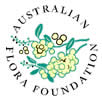Kathleen Owen
University of New England
Received the Australian Flora Foundation Young Scientist Award for her poster at ESA2007, the Ecological Society of Australia Conference on 25 – 30 November 2007 at the Perth Convention Centre, Perth, Western Australia.
Interference by poor quality pollen leads to pollen limitation of seed set in Bulbine bulbosa (Asphodelaceae)
Kathleen Owen, Glenda Vaughton – University of New England, Armidale, N.S.W, Australia
Pollination is an important ecological factor influencing seed set in natural plant populations. Floral density, pollinator abundance and foraging behaviour can affect both the quantity and quality of pollen deposited and may vary substantially among years. Pollen limitation was investigated in the perennial herb Bulbine bulbosa, over three flowering seasons, to determine if natural-seed set was limited by either the quantity or quality of pollen deposited by insect pollinators. The number of pollen grains deposited onto stigmas exceeded the number of ovules by more than 5-fold in all years, indicating that the quantity of pollen was not limiting. However, natural-seed set was about 25% less than cross-seed set in all years even though ovule fertilisation, after both treatments, was similar. Abortion of ovules fertilised by self pollen or genetically related pollen probably reduced natural-seed set. Supplementing stigmas with cross pollen after natural-pollination did not increase seed set, indicating that poor quality pollen interfered with cross pollen by pre-empting ovules. Similarly, in the glasshouse, cross-pollination approximately four hours after self-pollination resulted in significantly less seed set than did cross-pollination followed by self-pollination or cross-pollination only. Collectively, these results indicate that natural-seed set in B. bulbosa was limited, not by the amount of pollen deposited, but by the quality. Pollen deposited first, regardless of subsequent pollination, is likely to pre-empt and fertilise ovules, but may not be successful in siring seeds.
Submitted by: Kathleen Owen Email: kowen2@une.edu.au
